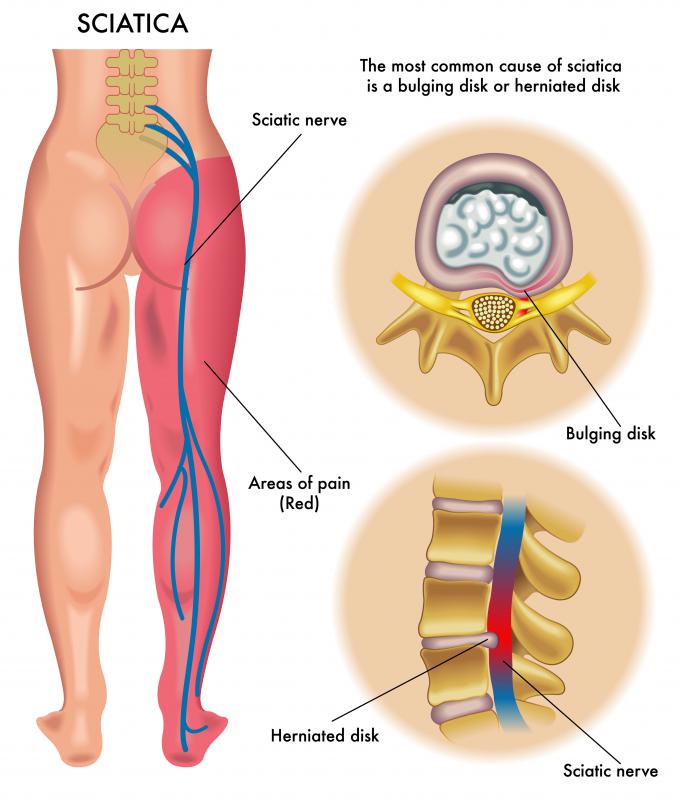At TheHealthBoard, we're committed to delivering accurate, trustworthy information. Our expert-authored content is rigorously fact-checked and sourced from credible authorities. Discover how we uphold the highest standards in providing you with reliable knowledge.
What Causes Nerve Inflammation?
The nerves are vital contributors to the human body’s function, as they help individuals interact with the surrounding world. When these sensory receptacles experience a malfunction, normal activities are hindered. Nerve inflammation, also called neuritis, represents one such potential problem. The irritation and enlargement of nerves can derive from a number of sources, including compression of the nerves due to injury, viral infections, reactions to drugs, and neuromas, which are growths or tumors in the tissues of nerves.
Although nerve inflammation may occur in various parts of the body, certain symptoms tend to be consistent across conditions. As many nerves deal with sensations relating to touch and feeling, numbness and tingling are often a consequence of nerve dysfunction. Nerves can also aid in movement, so muscular weakness could be another indicator of faulty nerves. Pain is another commonplace symptom of numerous inflammatory disorders.

Different types of nerve inflammation have different causes. One frequent source of inflammation is the nerve that travels from the lower back down the legs: the sciatic nerve. The resulting condition, sciatica, produces intense pain in the lower back and buttocks area. Typically, the inflammation can be traced to a back injury from heavy lifting, a bad fall, or some other trauma. Like many nerve inflammation cases, the injury leads to a pinched or compressed nerve and subsequent associated symptoms.

Inflammation of the nerves surrounding the brain and spinal cord can facilitate more serious disorders such as central nervous system vasculitis and multiple sclerosis. These disorders usually manifest through extreme muscle irregularities like uncontrollable spasms and intense weakness, severe numbness, difficulties in controlling basic bodily functions and movements, and impaired thinking abilities. Vasculitis, or inflammation of the blood vessels, may occur as an effect of another disease like lupus or arthritis, or it may also coincide with an adverse reaction to drugs. The origins of multiple sclerosis are less clear, although genetic susceptibility, virus infections, and a lack of exposure to sunlight have all been proposed as possible contributors to the condition.

Long-term and recurring nerve inflammations can also create a chain effect. For example, a possible consequence of multiple sclerosis is the development of an inflammation in the primary eye nerve: the optic nerve. The resulting optic neuritis has its own set of symptoms, which include pain around the eye, headaches, and blurred vision. On occasion, an individual can experience constant inflammation over various parts of the body. This disorder is known as chronic inflammatory polyneuropathy, and researchers believe it may derive from a weakened immune system.

As with any part of the body, tumors may develop on nerve tissue as well. Abnormal cell division begins most tumors, and the causes of such irregularities are still largely unknown. Non-cancerous growths can also irritate and impair nerves. Growths on nerves are known as neuromas. In neuromas, typical inflammatory nerve symptoms may occur.
Any prolonged symptoms should be called to the attention of a medical professional. Anti-inflammatory drugs like corticosteroids may be prescribed if deemed necessary. Depending on the results of medical tests and examinations, further actions may or may not be required.
AS FEATURED ON:
AS FEATURED ON:

















Discussion Comments
I think exercise is very useful in preventing many types of nerve inflammation, for example, sciatic nerve pain. A good exercise program keeps you moving and can prevent nerve irritation. Once pain flairs up though, you can begin a vicious cycle of pain and inactivity. Rest that leads to gradual exercise is a good remedy once nerve inflammation has occurred.
Post your comments